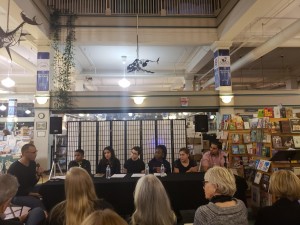Claire Rudolf Murphy’s newest book Martin and Bobby: A Journey Toward Justice follows the lives, words and final days of Martin Luther King Jr. and Robert Kennedy. Fifty years later, their stories and speeches still stir people young and old, as Claire has seen in her bookstore events throughout America.
Read below to hear from Claire on her inspiration for writing Martin and Bobby, and about the young leaders today who constantly inspire her—and the nation—to speak out for justice.
___
On the evening of April 4, 1968, Senator Robert Kennedy stood on the back of a truck in a black neighborhood in Indianapolis, Indiana. But instead of telling people why they should vote for him for president, he had to announce that Dr. Martin Luther King Jr. had been killed in Memphis, Tennessee.
Riots had already begun to erupt in cities across the country, but the crowd in Indianapolis stood silent in grief. Bobby told them that he didn’t blame them for feeling angry. Instead he said that they had a choice about “what kind of a nation we want to be . . . and what direction we want to move in.”
Bobby’s profound speech that night prompted me to research and write Martin and Bobby. I was a teenager in 1968; my memories are still vivid about that turbulent, tragic time. Fifty years later, the lives and words of Kennedy and King still offer Americans inspiration and insight about how our country can face the challenges of economic and racial inequality and the need for leadership today, at another divisive time in our country.
Because my book is for readers 10 and up, I wanted to include teen leaders in my presentations. Tonight, on MLK Day, student leaders from Moscow (Idaho) High School will discuss their own leadership work and what they believe is needed from our elected officials today.
At my book launch in October at Aunties’ Bookstore in Spokane, Washington, the student panelists were the highlight of the evening. The leaders were involved in many activities—student government, sports, civil rights and school safety—and came from diverse backgrounds—African American, white, Hispanic American, and Samoan American. They discussed how to best honor Dr. King’s legacy, what it means to be a leader and what today’s protest movements can learn from the civil rights movement.
After my 30-minute presentation I listened as a sense of hope, optimism and positive energy resonated through the room while the students spoke. Their responses were frequently interrupted by applause and a few tears, as several in the audience were alive when Dr. King and Senator Kennedy were killed.
At the conclusion of the panel, each of the panelists was asked why they were involved in the work they were doing:
“If I don’t change the world, I can at least spark someone else.”
“I want to put my voice out there to say I want things to change.”
The youngest panelist captured the spirit of the evening, saying, “There’s a lot of things that can be done and someone has to do it.”
Afterward the moderator, Spokane activist Devon Wilson, said, “It was a rare event in which a panel was more than a panel. It was a time for reflection on yesterday’s victories, a break from today’s constant crises and, most importantly, a glimpse into the promises of tomorrow.”
I am so honored by their participation and that of the students preparing to participate at BookPeople of Moscow in Idaho on MLK day, and Third Place Books in Seattle on February 2nd. They bring alive the words and actions of Dr. King and Senator Kennedy and hope for America’s future.
—Claire Rudolf Murphy

___
Additional information about Claire’s past and upcoming events can be found here.
No Comments
No comments yet.